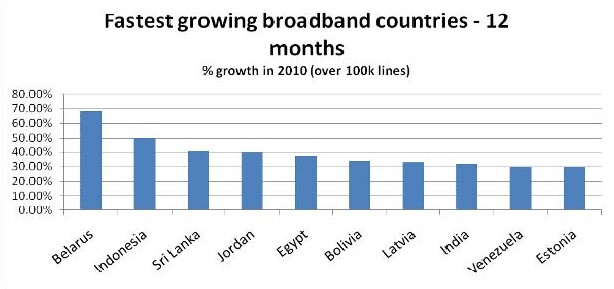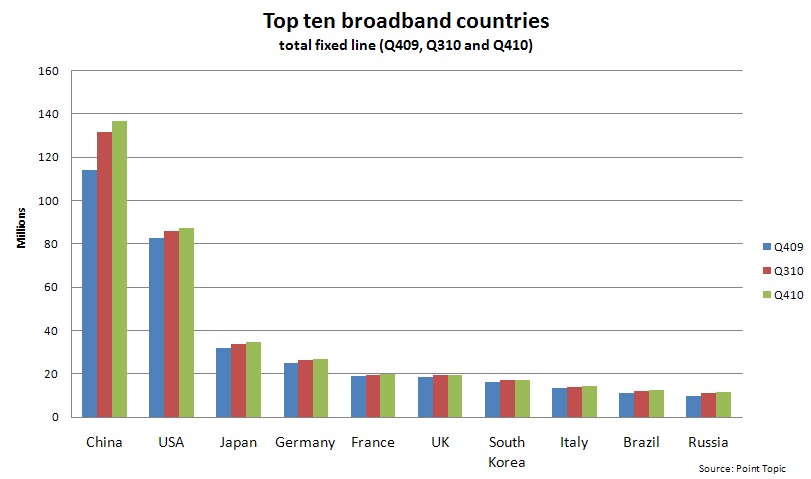Global IPTV subscription had a record 34.6% growth in 2010
Wednesday, March 23rd, 2011
Global Broadband Penetration Is The Critical Driver Behind Broadband Forum’s Ipv6 Solutions
LONDON — Global IPTV subscription had a record 34.6% growth in 2010 according to figures prepared by Point Topic and announced today by the Broadband Forum. 2010 was also a landmark year for broadband subscriptions – following the milestone half billion lines achieved in July 2010, subscriber figures continued to climb steadily and ended the year at 523,066,022 – a net addition of over 55 million lines during the year. With more and more devices coming online and broadband growing at such a steady rate, the timing could not be better for the release of BroadbandSuite™ 4.0, the IPv6 Toolkit of the Broadband Forum.
The final quarter of 2010 followed a similar pattern to the rest of the year in terms of percentage growth in broadband subscribers, reflecting a steady and sustained increase which was broadly in line with the previous two years. Asia is set to overtake Europe during 2011 with China still dominating the rankings both for total subscribers and net additions, as well as in percentage growth terms.
Meanwhile by the end of 2010 the total number of IPTV subscribers had reached almost 45.4 million, representing over 11.5 million new subscribers over the year and an annual increase of 34.6%. The fourth quarter was the strongest quarter for IPTV growth, adding more than 3.4 million new subscribers and accounting for 8% of the total growth.
Presenting the report at the IP&TV World Forum in London today, Laurie Adams Gonzalez, Marketing Director of the Broadband Forum, said: “2010 was a banner year for IPTV and broadband. We have watched how broadband is changing the world and creating a connected society that few could have imagined a few years ago. With great success comes real world logistical problems – the surge of new devices coming online will soon exhaust the IPv4 address pool. To address this looming problem, the Broadband Forum focused our resources to ensure specifications were in place for a smooth integration of the new Internet protocol, IPv6 into network and device management around the world.”
The BroadbandSuite™ 4.0 IPv6 Toolkit defines the network support of IPv6 from core to user, brings IPv6 to all TR-101 based network deployments, allows remote management of IPv6 devices, is scalable to address trillions of devices, and future enhancements have the potential to enrich the user experience (supporting secure, mobile and nomadic applications) and enable the proliferation of connected user devices. Most importantly, this IPv6 toolkit will help service providers reduce the impact of IPv4 protocol exhaustion on their services today while ensuring the growth of new users, devices and applications continues unhampered.
IPTV Regional growth
Europe held on to its number one regional spot, but the growth rate was lower in comparison to other markets, mostly due to maturing IPTV territories such as France and Belgium. Asia showed strong growth with over 50% for the year and is the one to watch to overtake Europe in 2011 as largest IPTV subscriber base. And although the region started with a low overall number of subscribers, the Middle East and Africa (MEA), had the strongest percentage growth – at 63.5%.
 2009Q4 2010Q4 % increase
---------- ---------- ----------
Europe 16,586,495 20,717,682 24.91%
Asia 10,837,200 16,365,767 51.01%
Americas 6,134,222 8,062,478 31.43%
Middle East and Africa 133,652 218,500 63.48%
---------- ---------- ----------
Global 33,691,569 45,364,427 34.65%
Source: Data provided by Point Topic
Six of the top 10 IPTV countries are in Europe, with France remaining the leading IPTV nation, passing the 10 million mark for the first time. China (including Hong Kong, Macau and Taiwan) also passed 10 million, and is closing the gap on France. It will almost certainly overtake France in Q1 or Q2 2011.
2009Q4 2010Q3 2010Q4
--------- --------- ----------
France 8,555,000 9,814,640 10,255,000
China (all territories) 6,526,000 9,078,000 10,002,000
USA 5,641,000 6,839,053 7,301,800
South Korea 2,370,219 3,205,026 3,645,650
Japan 1,774,981 2,081,457 2,213,117
Germany 1,121,000 1,387,500 1,513,200
Belgium 752,000 920,000 975,000
Spain 798,757 845,400 858,200
Italy 826,000 831,000 819,000
Sweden 654,000 739,500 770,000
Source: Data provided by Point Topic
Broadband Trends and Overall Growth
2010 saw a steady rise in the number of new broadband subscribers with 56 million subscribers added, accounting for 12% annual growth. Asia is moving to become the largest broadband region in the world and is likely to overtake Europe during 2011 in terms of total broadband subscribers. The Americas and the Middle East & Africa are still showing plenty of activity, but Europe and Asia show faster broadband adoption.
Region 2009Q4 2010Q1 2010Q2 2010Q3 2010Q4
------ ----------- ----------- ----------- ----------- -----------
Europe 175,746,887 179,269,755 182,444,480 185,296,595 188,881,105
Asia 153,720,190 161,771,644 169,375,420 177,816,795 184,591,415
Americas 123,505,797 126,091,441 128,047,756 130,662,813 133,861,702
Middle East and Africa 14,099,117 14,607,372 15,023,364 15,323,502 15,683,800
----------- ----------- ----------- ----------- -----------
Total 467,071,991 481,740,212 494,891,020 509,099,705 523,018,022
Asia is made up of a mixture of rapidly growing as well as relatively saturated mature markets and a large and increasingly affluent population. This means growth from new subscribers as well as a number of users trading up to higher speed broadband options as their broadband usage increases and local availability allows.
China continues to dominate the rankings both for total subscribers and net additions as well as the most rapidly growing, in percentage terms, market in the top 10 over the last 12 months.
“The Chinese broadband juggernaut continues to overshadow other markets. Growth is accelerating and this quarter is a significant improvement on the same period in 2008 and 2009,” says Oliver Johnson, chief analyst, Point Topic.
While China dominates, there continues to be plenty of growth in other parts of the market. The US, Japan and the UK all fared better in 2010 than they did in 2008 and 2009. Germany is doing reasonably well too, however there are indications of a slowing in other areas, such as France, Russia and Italy due to these being well established markets.
Top 10 Broadband Countries:
2009Q4Â 2010Q3Â 2010Q4
----------- ----------- -----------Â
China (all territories) 114,043,648 131,748,298 136,496,883
USAÂ 82,724,402 85,665,658 87,172,827
Japan 31,913,500 33,858,800 34,467,000
Germany 24,869,450 26,114,350 26,715,350
France 18,986,700 19,616,000 19,887,530
UKÂ 18,356,000 19,210,000 19,607,600
South Korea 16,348,571 16,945,182 17,202,641
Italy 13,343,890 14,072,128 14,257,650
Brazil 10,921,400 12,168,900 12,656,200
Russia 9,938,823 11,196,447 11,619,000
Source: Data provided by Point Topic
Meanwhile India continues its progress towards the Top 10. It will overtake Spain in the next quarter in terms of total fixed broadband subscribers and there is a possibility it will be in the top 10 by the end of the year.

Source: Data provided by Point Topic
Technology Overview
DSL continued to be the global access leader supporting 331 million subscribers. Cable’s market share is eroding and now sits at 106 million, while fiber is growing fast and is now serving 72 million customers. Fixed Wireless Access (FWA) and alternative internet access technologies continue to add market share as markets start to infill some areas where for various reasons it is difficult to deploy traditional fixed line access.
Technology Market Share 2010 Q4:
DSL 63.36% Fibre 13.82% Cable 20.34% Fixed Wireless Access 1.36% Satellite/Other 1.12%
Source: Data provided by Point Topic
DSL and fiber both dominate the Asian markets while cable is most popular in the Americas. With the US now seeing some results from its government commitment to broadband this may lead to a pick-up in fiber growth. DSL however is likely to become more and more dominant globally due to additions in Asia as the addressable market keeps growing.
The Broadband Forum in 2011
Building on such a solid year of growth and achievement in 2010, there are a number of major areas of activity for the Broadband Forum in 2011. The Forum will continue to add to its IPv6 Toolkit, expand its TR-069 CPE WAN Management Protocol and associated data models, develop PON solutions and test suites to support the growing fiber market requirements, as well as continue work around mobile backhaul and enterprise support. A strategic focus of 2011 is to develop the reference model for the next generation multi-service architecture and to ensure that the industry has the tools needed to address the requirements and opportunities that will come with Fixed Mobile Convergence (FMC).
“Our BroadbandSuite™ 4.0 is set to become the definitive work on IPv6, ensuring that the industry can address the exponentially growing device and smart gateway requirements of next generation broadband”, said Kevin Foster, Broadband Forum President. “As broadband continues to reach new corners of the world, we will do all we can to ensure Providers are equipped with all the tools necessary to succeed.”
Latest News
- Movistar Plus+ to create real-time short-form sports video with WSC Sports
- SeaChange to instead be acquired by Enghouse
- Rogers to bring Comcast and Xfinity products to Canada
- OTTera partners with ThinkAnalytics on enhanced personalization
- Televisa selects Synamedia edge gateway and distribution platform
- X Corp confirms intention to launch app for Smart TVs
